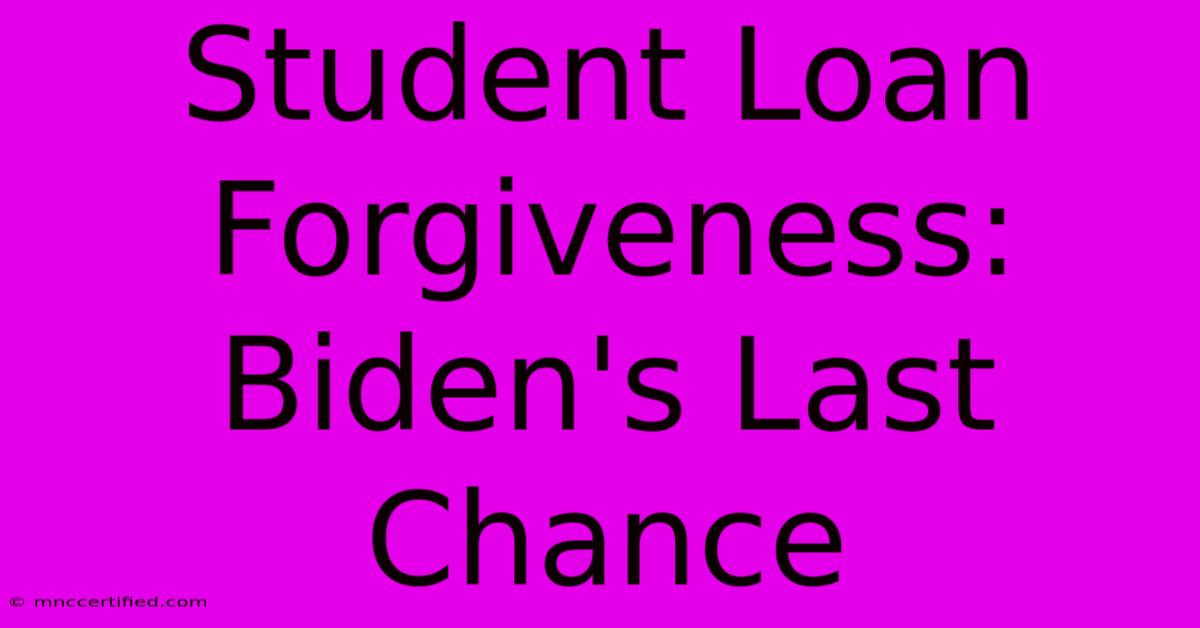Student Loan Forgiveness: Biden's Last Chance

Table of Contents
Student Loan Forgiveness: Biden's Last Chance?
The weight of student loan debt is crushing millions of Americans, hindering their ability to buy homes, start families, and build financial security. President Biden's administration has faced immense pressure to address this crisis, and with the Supreme Court's rejection of his broad loan forgiveness plan, the question remains: is this his last chance to deliver on a key campaign promise?
The Supreme Court's Ruling and its Implications
The Supreme Court's June 2023 decision declared the Biden administration's plan to wipe out or significantly reduce billions of dollars in student loan debt unconstitutional. The justices argued that the HEROES Act of 2003, the law the administration relied on, didn't grant the Secretary of Education the authority to enact such a sweeping program. This ruling left millions of borrowers in limbo and raised serious questions about the future of student loan forgiveness.
What Options Remain for Biden?
While the broad forgiveness plan is off the table, several avenues remain open to the administration:
-
Targeted Loan Forgiveness Programs: Instead of a blanket approach, the administration could focus on targeted forgiveness for specific groups, such as those facing extreme hardship or those who attended defrauded for-profit colleges. This approach could potentially navigate the legal hurdles encountered by the broader plan.
-
Income-Driven Repayment (IDR) Plan Improvements: Strengthening existing IDR plans could provide significant relief to many borrowers. This could involve simplifying the application process, lowering monthly payments, and ensuring faster loan forgiveness for eligible borrowers. The administration has already taken steps in this direction, but further enhancements could offer substantial benefits.
-
Legislative Action: Working with Congress to pass a new law authorizing student loan forgiveness is a potentially viable solution. However, this path faces significant political challenges, given the partisan divide on this issue. Securing bipartisan support would be crucial for success.
-
Regulatory Changes: The Department of Education could explore regulatory changes that offer more flexible repayment options or address specific issues within the existing student loan system. This approach allows for quicker implementation compared to legislative action but might not provide the same level of debt relief.
The Political Landscape and Public Opinion
The issue of student loan forgiveness remains highly politicized. While many Democrats strongly support broad forgiveness, Republicans largely oppose it, citing concerns about the cost and fairness to taxpayers who didn't attend college. Public opinion is divided, with strong support among younger voters and those burdened by student loan debt, but less enthusiasm among older generations.
Navigating the Challenges
President Biden faces a complex challenge. He needs to balance his campaign promise with the realities of the Supreme Court's decision and the political constraints. Any future action needs to be carefully considered to ensure it's both effective in providing relief and legally sound.
Is This Biden's Last Chance?
Whether this is President Biden's last chance to deliver significant student loan forgiveness is debatable. The remaining time in his presidency might not be enough for major legislative changes. However, targeted programs and regulatory adjustments could still provide substantial relief to many borrowers. The political will and strategic approach the administration takes will be crucial in determining the outcome. The clock is ticking, and the pressure is immense. The legacy of this presidency may, in part, hinge on how effectively it addresses the student loan debt crisis.
Keywords: Student loan forgiveness, Biden, Supreme Court, HEROES Act, student loan debt, Income-Driven Repayment (IDR), higher education, loan forgiveness programs, political challenges, student loan crisis, legislative action, regulatory changes, campaign promise.

Thank you for visiting our website wich cover about Student Loan Forgiveness: Biden's Last Chance. We hope the information provided has been useful to you. Feel free to contact us if you have any questions or need further assistance. See you next time and dont miss to bookmark.
Featured Posts
-
Bidens 4 28 B Student Loan Relief Plan
Dec 21, 2024
-
Bayern Munich Rb Leipzig Game Thread
Dec 21, 2024
-
Szas Lana Stillers Promotional Help
Dec 21, 2024
-
Denver Nuggets Funding Boys And Girls Clubs
Dec 21, 2024
-
Watch Bayern Munich Vs Rb Leipzig Live
Dec 21, 2024